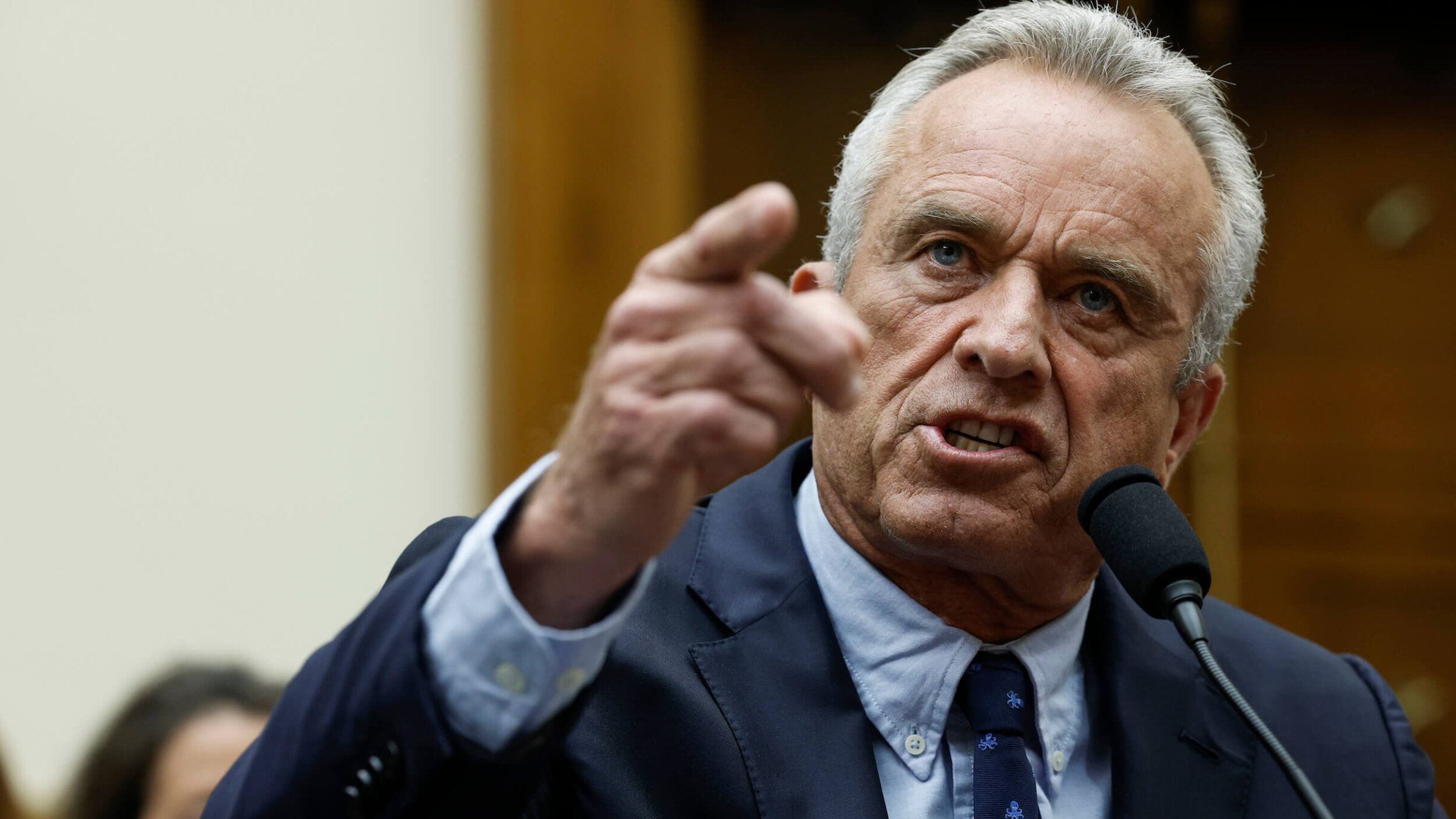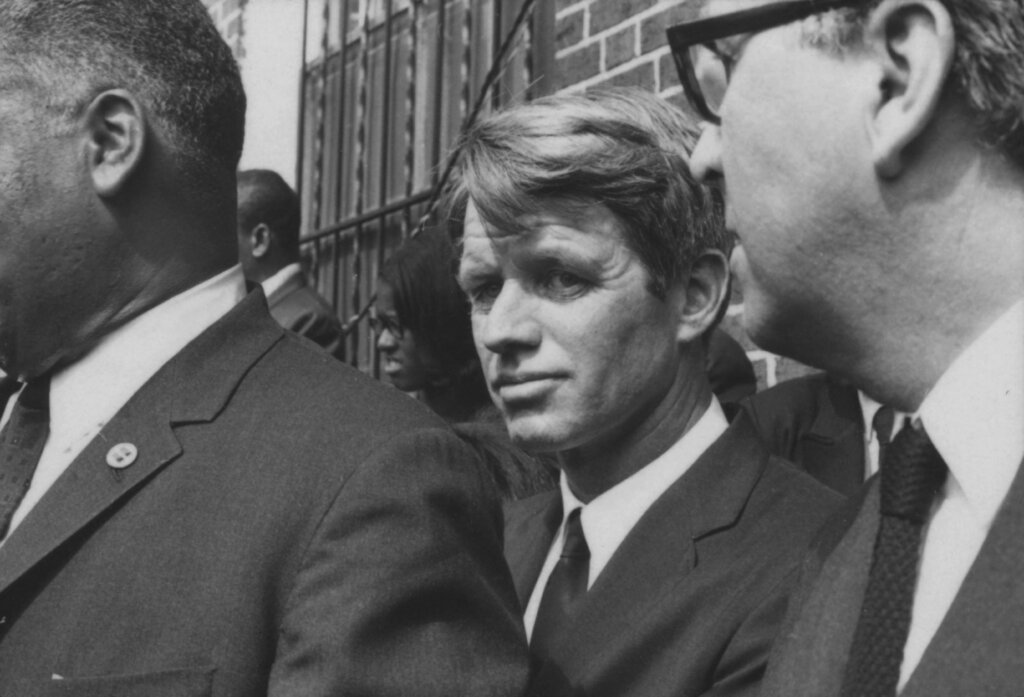Shmuley Boteach can’t make Robert Kennedy Jr. kosher
American Jews look at Bobby Kennedy’s son and see Donald Trump

Democratic presidential candidate Robert F. Kennedy Jr. speaks during a hearing with the House Judiciary Subcommittee on the Weaponization of the Federal Government on Capitol Hill on July 20, 2023. Photo by Anna Moneymaker/Getty Images
There’s one reason I won’t be watching Robert F. Kennedy Jr.’s public dialogue on antisemitism with Rabbi Shmuley Boteach this Tuesday evening: Robert F. Kennedy Jr.
It is hard to capture what RFK Jr.’s father, Bobby Kennedy, meant to a generation of American Jews, and it is even harder to square what we remember of the father when we hear the son. Sometimes the apple falls so far from the tree, you can’t even believe it’s an apple.
The latest outrage occurred when RFK Jr. told guests at a private campaign event in July that COVID-19 was an “ethnically targeted” bio-weapon that spared Chinese and Ashkenazi Jews.
Boteach defended RFK Jr. as “the opposite of antisemitic.” But I’m not sure Jews were as offended as they were just … sad. At least for Jews of a certain age, RFK Jr.’s campaign for the Democratic nomination for president is not a celebration of, as he would have it, “the values we have in common,” but an elegy for the values, and future, we’ve lost.
John F. Kennedy won 80% of the Jewish vote in 1960. Following his assassination, his brother Bobby assumed the mantle, combining idealism with a pragmatism that galvanized a generation of American Jews. Kennedy came out against the Vietnam War and became a strident voice for racial and economic equality.
“His heart and his energies were with the outcasts, the outsiders,” Frank Mankiewicz, Bobby Kennedy’s press secretary, wrote in his memoir. “He had solutions as well as soaring oratory.”
It wasn’t lost on American Jews that the son of Joseph P. Kennedy Jr., whose antisemitism was well-documented, had also become an early champion of Soviet Jewry and a passionate defender of the fledgling Jewish state.
At the height of the 1967 War between Israel and its Arab neighbors, Mankiewicz recalled, the Saudi Arabian ambassador condemned Kennedy, then a New York senator, on national TV for taking orders from “New York Jews.”
“I went to his office, told Senator Kennedy what was happening — on network television — and asked to talk about how he could retaliate. He thought for a moment, grinned, and said, ‘See if you can get CBS to play it again — in prime time.’”

That combination of idealism and realpolitik, the ability to not only envision a different future, but do the hard—and sometimes dirty—work of wresting it from a resistant present, drew a talented cadre of Jewish talent to Kennedy’s campaign. Among them were Mankiewicz, the son of legendary screenwriter Herman Mankiewicz, speechwriter Adam Walinsky and aide Peter Edelman.
“I think he had a foothold amongst people whose ancestors, like his own, had very difficult lives,” Lawrence Schiller, who served as Kennedy’s photographer for the last two-and-a-half weeks of his campaign, told me by phone.
Schiller was at the Ambassador Hotel in Los Angeles on June 5, 1968, when a Palestinian, seeking revenge on the one-year anniversary of the 1967 Arab-Israeli War, assassinated Kennedy.
If there was a small hope that Kennedy’s son would somehow pick up his father’s mantle, rarely has the distance between hope and reality been so great.
It’s as if RFK Jr. looked out onto the post-Trump landscape of American politics and decided what this country really needed is not more Bobby, but more Donald.
Like Trump, RFK Jr. peddles misinformation about science, then doubles down on his lies, blaming the mainstream media for twisting his words. And like Trump, he wins, even when the lies are exposed as lies. “It puts him in the headlines,” said Schiller. “And that, to him, is success.”
Like Trump, he traffics in antisemitic conspiracy theories despite showing no personal animus toward Jews. That enables the Jews closest to RFK Jr., like Boteach, to defend him against charges of being antisemitic, even as antisemites echo and applaud his message.
Is it a coincidence that RFK Jr.’s strongest Jewish support is coming from Boteach and Morton Klein, head of the Zionist Organization of America, who were often staunch defenders of Donald Trump as well? Like Trump, RFK Jr. thinks no matter how much you harm Jewish interests by spouting conspiracy theories and crackpot Holocaust comparisons, you can always win American Jews back with bouquets full of Israel support.
Bobby Kennedy was not perfect. We now know enough to separate the man from the myth. The Camelot Industrial Complex that lionized JFK and RFK has been challenged by the revelations of RFK’s order to wiretap Martin Luther King Jr., which gave FBI Director J. Edgar Hoover free rein to invade King’s private life. We now have evidence RFK was every bit as much of a cheater in his marriage as his brother.
But for Schiller, who curated the Smithsonian’s Centennial Exhibition on JFK on behalf of the Kennedy family and said he remains close to many members of the clan, the son has all the imperfections, and none of the qualities, of his father.
“He’s caused a great deal of harm to lots of people by what he says and how he says it,” said Schiller, “to his own family and to those people that cared for him and love him.”
All this matters because Kennedy seems to be flirting with a third-party run. In a close race, he could throw the election to Trump, who has an 80% disapproval rating among American Jewish voters.
How ironic. Leading up to the 1968 race, RFK and Richard Nixon ran almost dead even, with 17% going to the third candidate, George Wallace, the Alabama governor who espoused white supremacism and trafficked in conspiracy theories. Had Kennedy not been murdered, Wallace would likely have played the spoiler, edging the close race in Kennedy’s favor.
Who would have suspected that 50 years later, RFK’s son would become not the next RFK, but the next George Wallace?
Correction: The original version of this article misidentified George Wallace’s state. He was governor of Alabama, not Georgia.






















